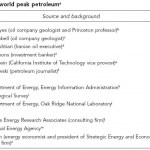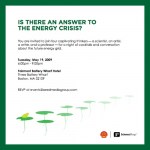energy
This entry is part of the Science and the European Election series, a collaboration between SciencePunk and the Lay Scientist blog to encourage public discussion of the science policies of the major parties standing at the forthcoming European elections.
Currently the EU imports over half of its energy. Recent disputes between Russia and it neighbours have highlighted Europe's precarious dependency on these imports. What are your proposals for increasing energy security?
Tim Worstall, UKIP:
Supply security of any product or input is achieved by widening the network of suppliers. We achieve…
We don't usually think of power outages as an important cause of poisoning but it is. Electrical power has become such a necessary part of basic needs -- think of light at night and refrigeration -- that if it is interrupted for more than a few hours people will turn to gasoline powered generators to provide it. Apparently, though, the fridge and the light bulb are not the only necessities. Experience with recent disasters is revealing that people have new kinds of imperatives:
Hours after Hurricane Ike roared ashore in Texas, more than two million homes were without power, which left some…
I made a gamble and my gamble failed. It really wasn't my fault. In the preview, they showed this huge barrel thing dropping on a see saw. It looked something like this: (I could search for 30 minutes for a picture of this online, or just draw it)
At first glance, this looked JUST like that video of the pile driver shooting the skydiver up in the air. You can see how I would make that mistake. To make up for my mistake, I will give a very simple analysis of the see saw myth. The basic idea is that something comes down, hits the see saw and sends the other thing flying up. If I assume…
Some of the other blog sites have talked about physics vs. chemistry. It seems this started with The experimental Error blog. Tom at Swans on Tea added a very excellent point to the discussion and the discussion continues at Uncertain Principles.
So, here is my take on the subject. Physics essentially deals with the fundamental stuff. You know, Maxwell's equations, the four forces, the particles, quantum mechanics. Chemistry is the study of substances and their interactions. First, let me attack chemistry. Here are some things I don't like:
Photo electron. What is a photo electron?…
Another electric motorcycle post. (Here is the post on the wind-recharged drag racing motorcycle) This new one is a solar powered motorcycle. The site claims that the bike can go 50 miles on a full charge (from Gas2.org). This is easily possible, but how long would it take to charge with normal solar panels? Here is an image of the bike.
Questions to be answered: How much energy would the bike need to go 50 miles? How much power (average) could you expect to get from the solar panels? And...how long would it take to charge this sucker. I am sure you can store enough energy in a…
This is a continuation from
href="http://scienceblogs.com/corpuscallosum/2009/05/peak_oil_imminent_public_healt.php">last
time. Sort of. Last time I wrote about some things from
a recent program at the Johns Hopkins University Bloomberg School of
Public Health, in conjunction with the Centers for Disease Control and
Prevention. I took the material from one of the many
presentations. since then, I have looked thought the slides from
the other presentations. It turns out that the majority of the
material relates more to Peak Oil than to Public Health. …
Science Blogs has a new special blog on sustainable energy called The Energy Grid. It is a short term project, planned to run a few months, where each of the six contributors posts once per week on a subject introduced on Sunday.
I am flattered to have been asked to contribute and you can read my first contribution posted today, here. It is headlined Sustainability will not come without reductions in consumption and here is a free sample:
Our energy system faces security and environmental challenges because we have created a social and economic paradigm based on over-consumption and a non-…
Last night was Wednesday, so of course I watched Mythbusters. You never know when a good blogging opportunity will come up. I could talk about the kinetic energy of arrows, but instead let me talk about their episode for next week. I only caught a glimpse of it in the preview. It looks like they are doing something about jumping on a see-saw and launching the other person. It could be this video they are looking at:
EMBED-Extreme Catapulting - Watch more free videos
From my analysis of this video, I found that the likely outcome was a broken board (if it were not fake). Also, if the…
A post at Energy Bulletin recaps a recent presentation at the
Johns Hopkins University Bloomberg School of Public Health, in
conjunction with the Centers for Disease Control and Prevention.
href="http://www.energybulletin.net/node/48895">The post is U.S.
public health community begins discussing peak oil.
The presentation was:
href="http://www.jhsph.edu/preparedness/events/eventscalendar.html">Peak
Oil: Implications for Disaster Preparedness & Response (the
link goes to the event calendar, so it probably won't be valid after a
while. The archives are
href="http://www…
Time Warp is this Discovery channel show that makes slow motion videos of stuff. Not too bad of a show (although I already talked about the samurai guy and "waves of energy").
Professor splash is this guy that jumps from really high positions and lands in 1 foot of water (and doesn't die). He was on Time Warp last night. If you are interested in this, I did an explanation of how it works in a previous post.
The Physics of Professor Splash's Jump into 1 foot of water
I haven't watched the whole show yet - but I did TiVo it. If there is any thing interesting to analyze, I will post that…
I just realized that something has been bothering me. It is this KillaCycle - the electric zoom-fast motorcycle that I posted about previously. It clearly is super fast. However there are two claims that seem iffy.
It can be recharged in 4 minutes.
It is recharged by wind power.
It may be possible that these individually could be true - but could it be recharged in 4 minutes by the wind? I am not sure. Let me do some estimations to see if this is possible. What am I starting with:
From the review on gas2.org, uses cordless drill batteries.
Uses 1200 batteries
Produces 500 bhp - not…
It`s kind of nice to hear an expert in the field making the same observation I often have about the economic arguments that swirl around the climate policy debates.
Specifically, opponents to mitigation policy have no trouble relying on the magic of the market and technology to rescue us from any possible difficulty climate change might visit upon us. This of course includes the loss of huge services nature provides us for free. You know, things like rain and sea food and forests.
Yet, make a suggestion that CO2 emissions need to be forced lower and the Pollyanna`s instantly become the most…
Well, maybe not Malthus, but Garrett Hardin and Paul Ehrlich -- the
1960's-era neomalthusian academicians -- have been right on the
money. There are hard limits to growth, and those limits are
upon
us. This is the contention of Charles A. S. Hall and John W.
Day,
Jr., two systems ecologists who have published a paper in American
Scientist.
The paper is still behind a pay wall at the publication site, but a PDF
copy can be obtained
href="http://www.esf.edu/efb/hall/2009-05Hall0327.pdf">from
Professor
Hall's web site. (HT:
href="http://www.theoildrum.com/node/5330#more">…
First: Car Talk is awesome. I wish I could come up with some class activities that help students become as good at trouble shooting and critical thinking as Tom and Ray are. Anyway, they are quite entertaining.
So, my Dad called and told me he heard a discussion on Car Talk about the effect DC to AC converters and accessories plugged in to it and how they would effect gas mileage. I skimmed through the last Car Talk podcast, but couldn't find it. He must have heard a re-run on the radio or something (he doesn't really believe in podcasts). Let me calculate the effect a number of things…
It is spring break, so we are at my parents house for a couple of days. The kids like it because there is a pool, a heated pool even. It really isn't that cold outside, but yesterday the water measured at 62 oF. So, with some help from the kids, we cleaned out the pool and turned on the heater. We also put a cover on it, hopefully to help it heat up some more.
This is perfect for a quick calculation. Is it reasonable that the pool could get up to a swimable temperature by tomorrow? Let me first make some assumptions and data:
15,000 gallons of water in the pool. This is about 57 m3.…
I am so pumped up that MythBusters is back on. Not only do I like the show, but it offers so many blogging opportunities. Their latest show featured car crashing myths. One of the myths from the episode was a redo of the myth where two trucks crash head on simultaneously crushing a smaller car in the middle.
The first test was very similar to the previous time they tested this, but faster. They towed two 18 wheelers to crash together around 50 mph and smash a stationary car. The results were impressive. However, they did not have the result of the car completely contained in the…
It's called 'feed-in tariffs.' From The Washington Monthly:
Why is the renewable energy market in Gainesville booming while it's collapsing elsewhere in the country? The answer boils down to policy. In early February, the city became the first in the nation to adopt a "feed-in tariff"--a clunky and un-descriptive name for a bold incentive to foster renewable energy. Under this system, the local power company is required to buy renewable energy from independent producers, no matter how small, at rates slightly higher than the average cost of production. This means anyone with a cluster of…
When my mother died last year at the age of 103 it ended a life that went from the Wright Brothers first flight through to the internet. That's a lot of change to accommodate, but she did it pretty well, although there were things she could not get used to. One of the things that was hardest for her to get used to was the prices of particular things, of which long distance telephone calls was an example. Long past the time when such calls had become ridiculously cheap, she was always nervous about talking "long distance." I'll grant you it's sometimes hard to adjust, always comparing things…
My latest Science Progress column contemplates this question, in the wake of a spot of news that doesn't seem to have caused any uproar (yet)--namely, that DARPA, the Defense Advanced Research Projects Agency, is apparently holding an event to discuss the prospect of geoengineering the climate.
As I write in the column:
This is newsworthy for at least two reasons: The U.S. government has, thus far, kept the subject of geoengineering at a relative arm's-length; and one reason for that shyness is the extremely checkered past history of U.S. military ventures in weather modification, including…

